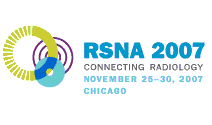
Abstract Archives of the RSNA, 2007
LL-VI6098-L06
Palliative Efficacy of CT-guided Percutaneous Radiofrequency Ablation in Recurrent Rectal Cancer
Scientific Posters
Presented on November 28, 2007
Presented as part of LL-VI-L: Vascular Interventional: Ablation
Giuseppe Belfiore MD, Abstract Co-Author: Nothing to Disclose
Barbara Amore RRA, Abstract Co-Author: Nothing to Disclose
Rosa Pietropaolo MD, Abstract Co-Author: Nothing to Disclose
Maria Luisa Barretta, Abstract Co-Author: Nothing to Disclose
Maria Paola Belfiore, Abstract Co-Author: Nothing to Disclose
Enrico Tedeschi MD, Presenter: Nothing to Disclose
To evaluate the clinical and imaging effects of CT-guided radiofrequency ablation(RFA) of recurrent rectal adenocarcinoma(RAC) with prolonged follow-up.
20 adult patients(12 males,8 females),with locoregional painful recurrence of RAC, previously treated with Miles surgery(20) and radiotherapy(12), underwent percutaneous RFA, performed under CT guidance in mild sedation analgesia with palliative intent. 11 lesions (max diameter5cm) RFA was performed with single positioning of a 15-G multitined expandable “hot-tip” electrode(RITA Medical Systems,USA). The latter device was also used if, during follow-up, clinical and imaging findings prompted retreatment. Follow-up was performed with clinical evaluation(Brief Pain Inventory, BPI) and contrast-enhanced (CE) CT/MRI at 3,12,24,36 and 48 months.
The procedure was well tolerated by all patients. 3 months after RFA, dramatic pain reduction was observed in 11 cases, while 3 patients experienced pain recurrence, although diminished.
At CE-CT, size or density was decreased in 15 lesions, with 2 lesions (5cm) had to be retreated, at 4 and 9 months respectively, due to pain recurrence. At 12 months, 15 patients were symptom-free and 4 had mild pain (BPI scores drop >4), with 1 case of drop-out. All assessable lesions showed no signs of residual active disease at CE-CT/MRI. At 2 years, 7 patients are still alive and symptom-free, with stable lesions at imaging, 6 are alive with mild locoregional pain and stable lesions, 3 are dead, and further 2 were lost to follow-up. At 3 years, 4 patients are symptom-free and 4 have mild locoregional pain. At 4 years, still 1 patient is alive and symptom-free.
RFA may achieve prolonged locoregional pain control in patients with otherwise untreatable pelvic recurrence of RAC, and improves quality of life
Patients with painful recurrent rectal cancer may benefit from CT-guided RFA, which is safe and provides a long-lasting effective pain palliation, improving life quality.
Belfiore, G,
Amore, B,
Pietropaolo, R,
Barretta, M,
Belfiore, M,
Tedeschi, E,
Palliative Efficacy of CT-guided Percutaneous Radiofrequency Ablation in Recurrent Rectal Cancer. Radiological Society of North America 2007 Scientific Assembly and Annual Meeting, November 25 - November 30, 2007 ,Chicago IL.
http://archive.rsna.org/2007/5004711.html

